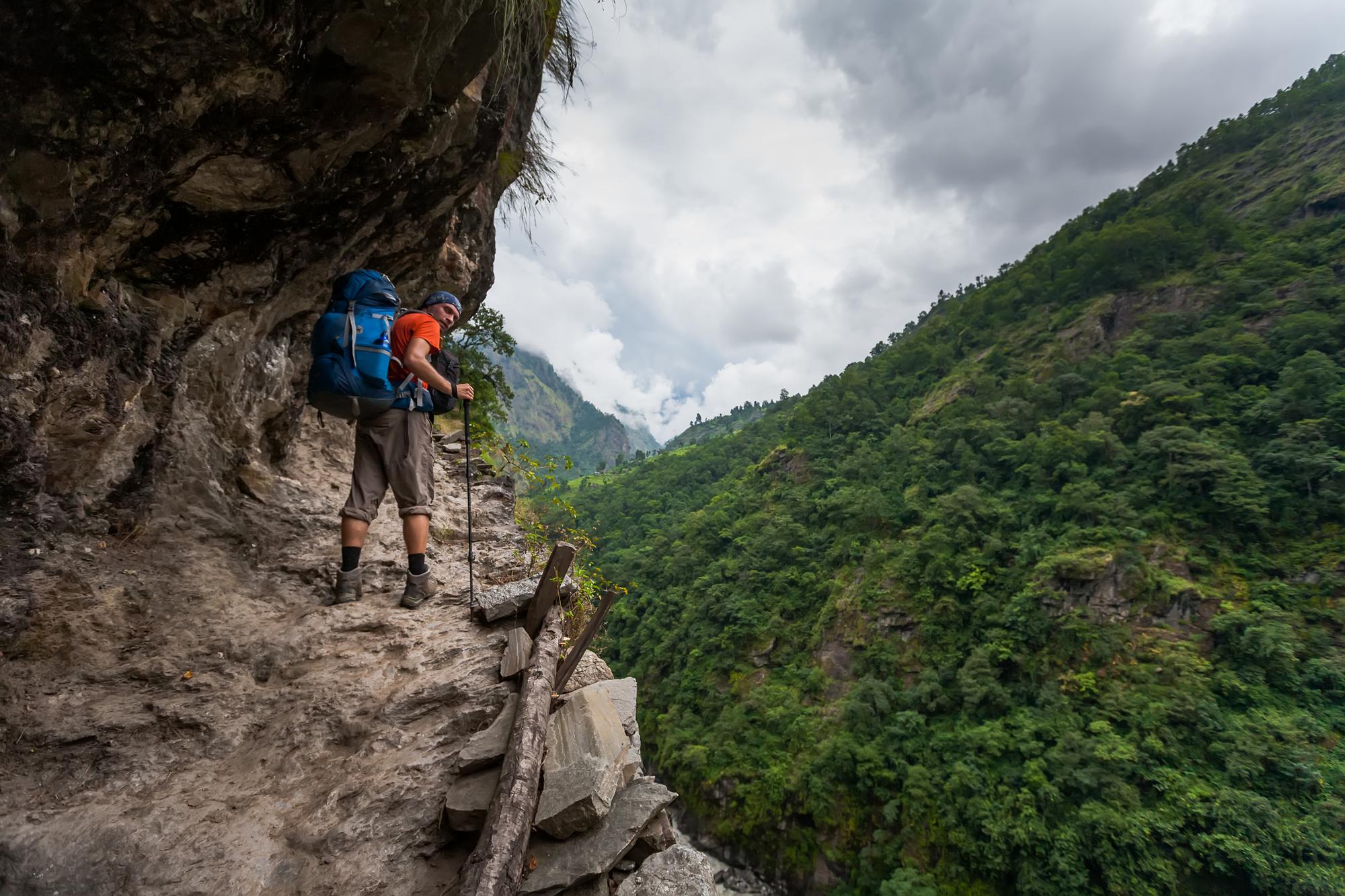9 Survival Tips To Know Before Going On A Trek
Trekking is one great outdoor activity that takes you on an adventurous expedition in the mountains. Even for a beginner, it can be a really exciting start to explore some hidden trails. But trekking can go very wrong very fast if you go into it completely unprepared. Whether it is your first trek or your fiftieth, there are certain tricks and tips that can help you along the way. So, if you are thinking of hitting one of those trekking trails, hold your horses; read up about these 9 survival tips to know before going on a trek.
Waiting to throw a backpack on and head out? Read these survival tips to know before going on a trek. Picture by Vivek Sharma
Pick Your Route Wisely
Every trekker goes off to trek on a route, and not just into the open with no plan. People who trek more times than you ever will? Count them in. All those trekkers you follow on social media, who seem like they just jump up and tramp off into the wild? Yes, them too. Before getting into the many survival tips to know before going on a trek, you need to put some thought into the trek route you pick.
To begin with, there are many ranges of difficulty that you can choose from depending on the ability and the level of expertise in trekking/hiking. Choose a route that you are confident of handling, especially if you’re going to trek alone or for a long duration of time. Additionally, think about things like the distance from the nearest habited location, how far it is from your accommodation, and how cut off the trail is. Safety on a trek begins with a well-thought-out plan, so keep this in mind.
Familiarize Yourself With The Route
After choosing your trek, the next step is to go through every intricate detail of your route to get you familiarized with it. If you’re heading out with a group, ensure everyone has an idea of the trek route layout. This includes where you can stop for potable water, the nearest village or outpost, and so on. If possible, speak to other trekkers and read up about your route, creating a rough map you can carry with you. This is particularly beneficial for multi-day treks.
When joining an organized trek, you’re likely to get a detailed itinerary that covers everything from inclusions to the routes that are to be taken. Nonetheless, make sure you know your lay of the land. While none of us ever want anything to go wrong, preparedness is key.
Check The Weather Before Leaving
Do a spot of research on the weather in the region of your trek, and keep an eye on the weather before you leave. This could be a savior for you, as the weather in the hills and mountains changes at a quick pace. You won’t have much time to think or react when you see the change coming if you aren’t already prepared. Additionally, a weather check will give you some valuable information on how to dress and what to pack. You’ll be thankful for lugging around that huge windcheater when you’re stuck in a cold shower of rain!
Awareness and preparedness go hand in hand; being aware before leaving will save you from sudden surprises if the weather decides to go a little crazy.
Pack The Essentials
Always keep a check on all the essentials needed while on a trek. Once your trek is decided, you know what you need, so start collecting your essential gear and packing accordingly. Now, the trick here is to work smart and not hard. You need to pack stuff in a way that you have all the things you need but it doesn’t get too heavy while you are traveling. So, make sure to keep your backpack as light as possible. Things that you should include in your pack are:
Sunglass/Sunscreen
Headlamp/Flashlight
Map & Compass
Sleeping Bag
First-aid Kit
Lighter/Matchstick
Extra Clothes
Sufficient Water
If you’re off on a multi-day trek and want some groundbreaking advice on packing light, turn to an ultralight backpacker. These guys truly know how to shave weight off their shoulders.
Prepare Your Meals
Even if your trek includes three meals, try and prepare an extra box of munchies for quick bites in between, or as rations in case of an emergency. Carry high protein bars, sandwiches, biscuits, a few snacks, and chocolates for energy to keep you going throughout the trip. Instant tea and coffee sachets work well for longer treks on which you have a battery-operated kettle. In terms of emergency rations, you’ll need food that won’t spoil. Think dehydrated fruits, dry fruits, and protein bars.
Avoid canned or heavily packaged food, since that could take a lot of space in your backpack. Instead, try and prepare one small box with all the munchies inside it so that it’s easy for you to carry and eat from it while trekking. And of course, remember not to litter! Nature doesn’t need more plastic messing her up.
Safety Precautions
This is of the most important things to do before going on a trekking trail. Someone from family or close friends should always know your itinerary so that they are aware of your location while you are traveling. Also, you never know when an emergency situation arises and you might need immediate help. It is always in your interest to inform your close ones of all the details of your trek, including transportation details, accommodation, and the ones who are accompanying you. Let them know when they can expect to hear from you, and when you’re expected to return so that they are not left worrying about your whereabouts.
Stay Hydrated
Besides all the essentials, make sure to carry enough water to keep yourself dehydrated throughout the trek. The trick to carrying enough water is to first understand where your refill points will be. Ensure you carry a little over the amount that would be just enough from one point to the next.
You can always go a few days without eating food, but without water, you can soon be in dire straits. Remember to Be Water Wise! Consciously drink water and quench your thirst, and ensure you rest under some shade when you feel dizzy. Carrying too much water ‘as a precaution’ will only tire you out faster.
Prepare Yourself
Whether this is your first trek or your tenth, physically and mentally preparing for the exertion is of the utmost importance. Don’t see why this is one of the survival tips you need to know before going on a trek? Well, all the fantastic views of a trek only come after hours of huffing and puffing your way up. Getting in a little training before you leave prepares your body for exertion. In case of an emergency or in a situation where you lose the path, being reasonably fit can make all the difference.
Start with some light exercises like running, jogging, skipping, and try to pump yourself into physical fitness. This will help you pace yourself to maintain your energy throughout your trekking journey.
Learn First-Aid And SOS Signal Basics
Yes, we admit, thinking of potentially life-threatening scenarios is far from that ‘wanderlust vibe’ you’re going for. But like we said, being prepared for such situations ensures you make it out alive, armed with a hair-raising tale of survival. One of the survival tips you need to know before going on a trek is the basics of first aid. This includes things like the RICE method for sprains, treating cuts and splinters, and spotting signs of dehydration in yourself.
Secondly, learn a few SOS signaling and survival basics. Keep in mind the morse code for SOS (three dots, three dashes, three dots); you can blast out signals from a survival whistle (ensure you carry one) or use a flashlight in the dark if needed. Use reflective objects and the sun to flash light signals, and learn how to safely start a fire to keep warm and use as a signal.
Conclusion
Sure, it needs sheer determination and mental makeup to go on a trek, but the mesmeric view you witness at the end of your trek makes it all worth the effort. Of course, there’s a lot more that happens beyond discovering scenic hamlets and sunset hues while on a trek. Keep in mind these survival tips to know before going on a trek so that you can trek without worrying, and be prepared to dish out damage as soon as trouble shows up. Looking for some comfy, affordable accommodation option as a base? Check out our goSTOPS hostels; we’re in over 20 locations in the country. Plus, there’s a good chance you’ll befriend some like-minded avid trekkers when at our hostel!
FAQs
What Things Should I Know Before Going On A Trek?
Before a trek, you should always familiarize yourself with the itinerary and destination to prepare yourself accordingly. Ensure you look up the weather and dress accordingly. Finally, scope out the distance to the nearest village or town as well.
What Should I Avoid Wearing While Going On A Trek?
One should always go for something light while going on a hike. Avoid wearing cotton as it tends to absorb water and dampens the clothes. Wear sturdy shoes and preferably long pants to protect your legs from bites and scratches. Avoid denim, since it gets extremely heavy when wet and doesn’t dry quickly.
What Are The Benefits Of Going On A Trek?
There are many health benefits of trekking including lower stress levels, enhancing metabolism, lower blood pressure, improved bone density, enhanced mental being, and improved physical fitness.
What Is The Difference Between Hiking And Trekking?
Hiking is usually of shorter duration, and it includes walking in beautiful surroundings on pre-charted paths called hiking trails. A trek on the other hand is a long journey on foot, on hidden and offbeat trails. There can be half-day or one-day treks, as well as longer durations.
Upcoming Experiences
[[ event.name ]]
[[event.duration]]
From [[price.price | number:0]]
From [[event.price | number:0]]
Free
[[ batch.startdate|date]] [[batch.soldout ? ' (Soldout)':'']]

